Are you enchanted by the unique charm of Lop Ear rabbits? Their distinctive floppy ears and playful personalities make them wonderful companions, but proper Lop Ear Rabbits Ear Care is crucial to their well-being. This comprehensive guide will delve into the common Problems that arise with their ears and offer practical Solutions to keep your furry friend healthy and happy. From understanding their unique needs to addressing specific health issues, this guide will equip you with everything you need to ensure your Lop Ear rabbit thrives. Discover expert tips and essential care strategies for your lovable pet!
Ultimate Guide to Lop Ear Rabbit Ear Care: Common Problems and Practical Solutions
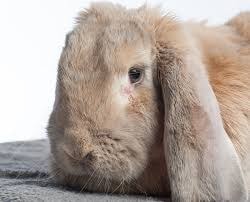
Lop ear rabbits are known for their adorable floppy ears. These unique features make them cute, but they also need special care. Proper Lop Ear Rabbits Ear Care is key to keeping your furry friend happy and healthy. Lop ear rabbits can get ear problems more often than other rabbit types, so understanding common Lop Ear rabbit problems and their Solutions is essential for their well-being.
Regular ear checks and cleaning can prevent many issues and keep your lop-eared buddy comfortable. It’s not hard to do, but it’s essential. Learning about common ear problems in lop rabbits can help you spot issues early. Knowing what to look for, from ear mites to infections, is the first step in helping your rabbit. You can keep your lop’s ears in great shape with the right care.
Key Takeaways
- Ensure your Lop Ear rabbit’s ears are checked and cleaned weekly. Regular maintenance helps prevent common ear issues and keeps your bunny comfortable. Use a damp cotton ball and be gentle to avoid pushing debris deeper into the ear canal.
- Lop Ear rabbits are prone to ear problems such as mites, infections, and wax buildup. Look for signs like redness, swelling, unusual odors, or excessive scratching. Early detection of these issues is crucial for effective treatment.
- For ear mites or infections, consult your vet for appropriate treatments, including ear drops or antibiotics. Use a gentle ear cleaner for wax buildup, and avoid inserting anything deep into the ear canal. Address injuries promptly with proper cleaning and vet care if necessary.
- A healthy diet and clean living environment play a significant role in preventing ear problems. Provide a balanced diet rich in hay and fresh vegetables, and maintain a clean, dry living area to minimize moisture and debris.
- If you notice signs of severe ear issues, such as persistent head tilting, balance problems, or changes in hearing, seek veterinary care. Early professional intervention can prevent minor problems from escalating into serious conditions.
Understanding Lop Ear Rabbits
Lop-ear rabbits are known for their distinctive droopy ears. These bunnies come in various breeds and have unique traits that set them apart from other rabbits.

Defining Lop Ear Rabbit Breeds
Lop-eared rabbits include several breeds recognized by rabbit associations. The main types are:
- Holland Lop
- French Lop
- American Fuzzy Lop
Each breed has its size, weight, and specific ear characteristics. Holland Lops are among the smallest, while French Lops are among the largest lop breeds.
Characteristics of Lop Ear Rabbits
Lop-ear rabbits have floppy ears that hang down instead of standing upright. This feature gives them a cute, puppy-like appearance. Their ears can vary in length and width depending on the breed. These rabbits often have:
- Rounded heads
- Compact bodies
- Soft, dense fur
Lop ears can affect a rabbit’s hearing slightly, but not significantly. You may notice your lop-eared bunny turning its head more to locate sounds. Dental issues are more common in lop rabbits due to their skull shape. Regular check-ups are important to catch any teeth problems early.
Basic Ear Care for Lop Ear Rabbits
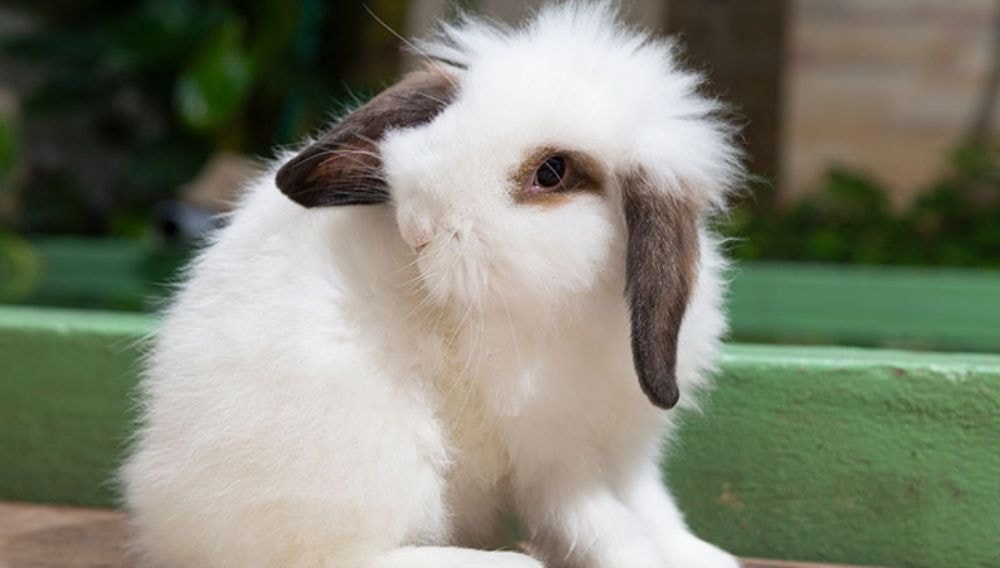
Proper Lop Ear Rabbits Ear Care is crucial for maintaining your pet’s health and happiness. Regular cleaning, gentle handling, and a clean environment help prevent ear problems and keep your bunny content.
Routine Cleaning
Check your rabbit’s ears weekly for dirt, debris, or discharge. Use a cotton ball dampened with warm water to clean the ears if needed gently. Be careful not to push debris further into the ear canal. For deeper cleaning:
- Get ear cleansing solution from your vet
- Hold your rabbit securely in your lap.
- Massage the base of the ear for 20-30 seconds.
- Keep the ear upright to avoid splashing.
- Use cotton balls to remove loosened wax.
Clean ears help prevent infections and discomfort for your lop-eared friend.
Handling and Comfort
Be extra gentle when handling your lop’s ears. Their ear cartilage is fragile and easily damaged. Support the base of the ear when lifting or examining it. When grooming:
- Use a soft brush
- Be careful around the ears.
- Avoid pulling or tugging.
Lop-eared rabbits have sensitive skin, so be extra careful when brushing near their ears. After handling, always reward your rabbit with treats and praise to build positive associations.
Environment and Bedding Considerations
Keep your lop’s living area clean to reduce the risk of ear problems. Change bedding regularly and remove any damp or soiled material promptly. Choose bedding that’s:
- Dust-free
- Absorbent
- Soft on delicate ears
Avoid drafty areas that could irritate your rabbit’s ears. Maintain a stable temperature and humidity level in their living space. Provide hiding spots and tunnels where your lop can rest their ears comfortably. This helps reduce stress and promotes overall ear health.
Common Ear Problems in Lop Ear Rabbits
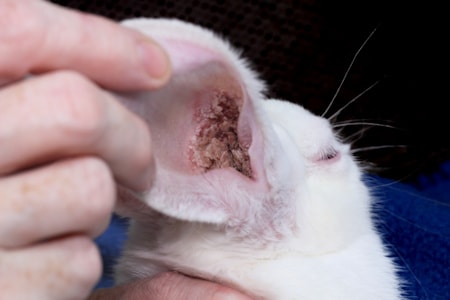
Lop ear rabbits are prone to several ear issues due to their unique ear structure, which makes Lop Ear Rabbits Ear Care crucial. These problems can affect your rabbit’s health and comfort if not addressed promptly.
Ear Mites and Infections
Ear mites are tiny parasites that can infest your lop rabbit’s ears. They irritate, scratching, and head shaking. You might notice dark, crusty discharge in the ears. Bacterial or fungal infections can also occur, leading to redness, swelling, and discharge. These issues often result from moisture buildup in the folded ears. To spot problems early, check your rabbit’s ears weekly. Look for:
- Redness or swelling
- Unusual odor
- Excessive scratching
- Head tilting
If you notice these signs, consult a vet right away. Treatment may include ear drops, oral medications, or topical ointments.
Wax Buildup
Lop rabbits tend to accumulate more ear wax than other breeds. This buildup can trap moisture and debris, creating an ideal infection environment. Signs of excessive wax include:
- Dark, sticky substance in the ear canal
- Strong odor
- Your rabbit is rubbing its ears frequently.
To prevent wax buildup:
- Clean your rabbit’s ears regularly.
- Use a gentle ear cleaner made for rabbits.
- Never insert anything into the ear canal, as this can cause injury.
- Gently wipe the visible parts of the inner ear with a soft, damp cloth. Ask your vet for a demonstration if you need clarification on cleaning techniques.
Ear Injuries
The limp nature of lop ears makes them more susceptible to injuries. Your rabbit might accidentally step on its ears or get caught on objects. Common ear injuries include:
- Cuts or scratches
- Torn ear tissue
- Hematomas (blood blisters)

Did You Know?
To prevent injuries, ensure your rabbit’s living area is free from sharp edges or places where ears could get snagged. Trim any overgrown fur around the ears to improve visibility. If an injury occurs, clean the area with a mild antiseptic solution. For serious injuries or large cuts, seek veterinary care immediately.
Here’s an additional video about Lop Rabbit ear problems.
By: Baby Blue Bee Bunnies
Preventive Measures
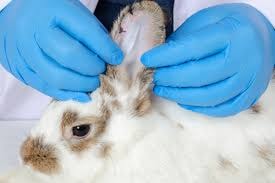
Taking care of your Lop Ear rabbit’s ears is key to keeping them healthy. Proper Lop Ear rabbits ear care, good nutrition, regular vet visits, and proper grooming can help prevent many ear problems.
Diet and Nutrition
A healthy diet is vital for your lop-eared rabbit’s ear health. Feed your bunny plenty of hay, which makes up 70-80% of their diet. Hay helps wear down their teeth and keeps their digestive system working well. Give your rabbit fresh vegetables daily. Good choices include leafy greens like romaine lettuce, kale, and parsley. Offer small amounts of fruits as treats.
Make sure your rabbit always has clean, fresh water. Proper hydration helps keep their ears clean and free from wax buildup. Avoid sugary treats and high-carb foods. These can lead to obesity, which puts extra strain on your rabbit’s ears.
Regular Veterinary Check-Ups
Take your lop-eared rabbit to the vet at least once a year. Your vet can spot early signs of ear problems before they become serious. During check-ups, the vet will examine your rabbit’s ears closely. They’ll look for signs of infection, mites, or other issues.
Your vet can also clean your rabbit’s ears if needed. They have special tools to do this safely without hurting your bunny. Ask your vet about ear-cleaning products you can use at home. They can recommend safe options for your rabbit.
Hygiene and Grooming Practices
Brush your lop-eared rabbit’s fur regularly. This prevents matting and helps you spot any skin issues near the ears. Check your rabbit’s ears daily for signs of redness, swelling, or discharge. Early detection can prevent serious problems.
Clean your rabbit’s ears gently with a damp cotton ball if needed. Don’t use cotton swabs, which can hurt your bunny’s ears. Keep your rabbit’s living area clean and dry. Damp conditions can lead to ear infections. Trim your rabbit’s nails regularly. Long nails can scratch their ears when they groom themselves.
Solutions and Treatments
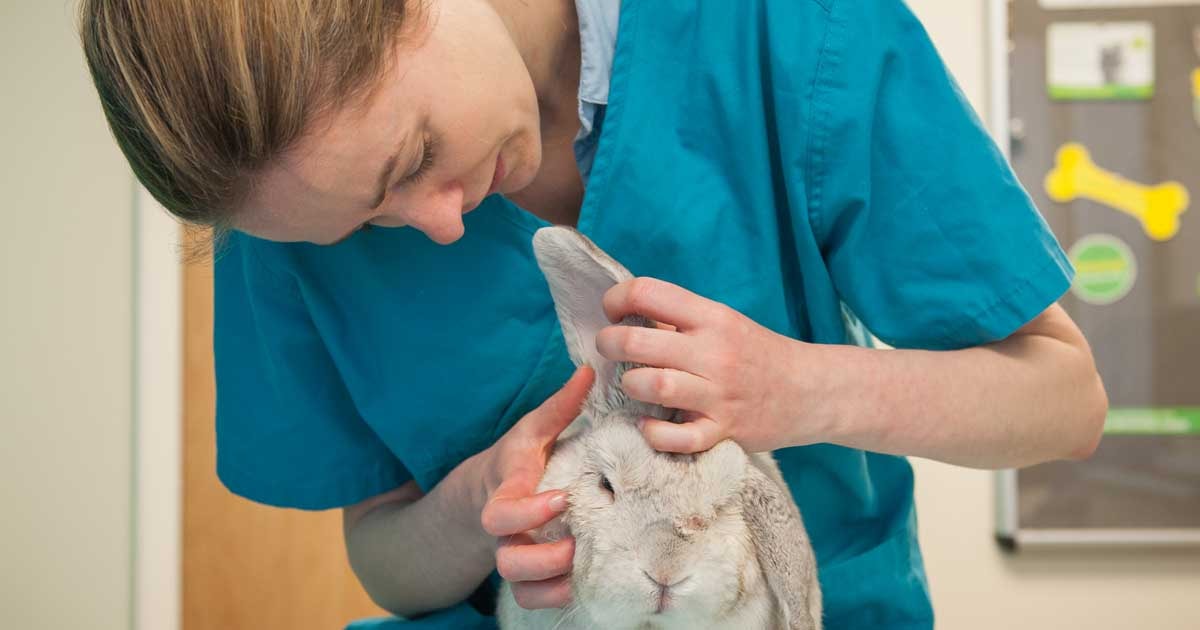
Caring for Lop Ear rabbits’ ears requires specific treatments and care. You can use medications, home remedies, or surgery to address ear problems in your bunny. Proper Lop Ear rabbits ear care ensures your furry friend remains comfortable and healthy.
Medications and Topical Treatments
For ear infections, your vet may prescribe antibiotics or antifungal medications. These can be given orally or as ear drops. Topical ear treatments like liquid flushes or powders can help clean and dry the ear canal. Pain relief is often needed. Anti-inflammatory drugs can reduce swelling and discomfort.
Your vet will recommend the right dosage for your rabbit’s size and condition. Ear mites may require special treatments. Ivermectin is commonly used to kill these parasites. Always follow your vet’s instructions when applying any medications.
Home Remedies
You can take steps at home to keep your lop’s ears healthy. Regular cleaning is key. Gently wipe the visible parts of the ear with a damp cotton ball. Don’t push too deep into the ear canal. Massage the base of the ear for 20-30 seconds. This helps loosen wax. Your rabbit might shake its head, so be prepared.
Keep the ears dry. Carefully dry the ears with a soft towel after baths or if your rabbit gets wet. This prevents moisture buildup that can lead to infections. A healthy diet supports ear health. Ensure your rabbit gets plenty of hay and fresh veggies. Good nutrition boosts the immune system.
Surgical Interventions
In severe cases, surgery might be needed. This is often a last resort when other treatments haven’t worked. Ear canal resection is one option for chronic infections. For tumors or severe injuries, part of the ear may need to be removed. This is called a partial pinnectomy. Full ear amputation is rare but sometimes necessary.
After surgery, your rabbit will need extra care. Keep the surgical site clean and dry. Watch for signs of infection, like redness or discharge. Your vet will provide specific post-op instructions. Follow-up visits are crucial to ensure proper healing. Be patient, as recovery can take several weeks.
Lop Ear Rabbits Ear Care: Monitoring and Ongoing Care
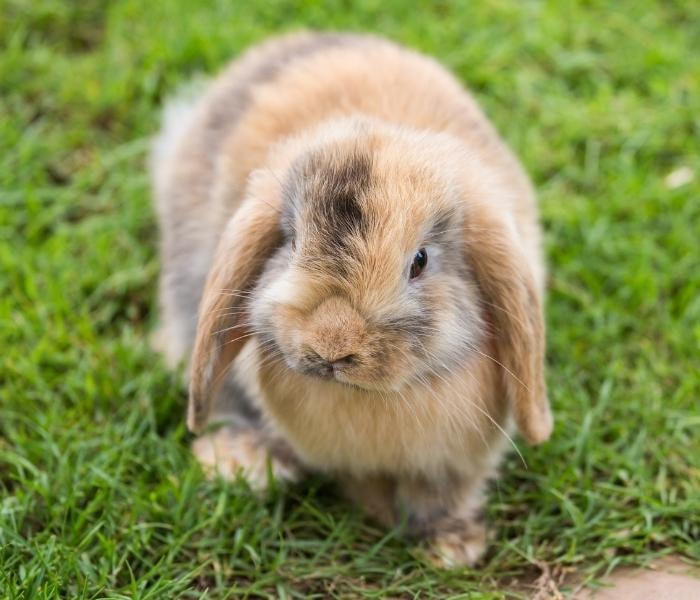
Keeping a close eye on your lop-eared rabbit’s ears is key to catching problems early. Regular checks and good habits help prevent issues before they start.
Behavioral Observation
Watch your rabbit’s behavior for signs of ear discomfort. Head shaking, scratching, or tilting may point to ear problems. Look for changes in eating, playing, or social habits too. Check your rabbit’s ears weekly. Gently fold them back and look inside.
The ears should be clean and pink, without redness or discharge. A foul smell could mean an infection. If you notice anything unusual, contact your vet right away. Early treatment can prevent small issues from becoming big problems.
Long-term Management Strategies
Clean your lop’s ears regularly to prevent wax buildup. Use a damp cotton ball and be very gentle. Never insert anything into the ear canal. Brush your rabbit’s fur often, especially around the ears. This helps prevent matting and lets you spot any skin issues.
Keep your rabbit’s living area clean and dry. Damp conditions can lead to ear infections. Provide a balanced diet rich in hay to support overall health, including ear health. Consider routine vet check-ups, even if your rabbit seems fine. Your vet can catch early signs of ear problems you might miss.
Record Keeping and Tracking
Start a health journal for your rabbit. Write down what you notice when you clean their ears. Note any unusual behaviors or symptoms. Keep track of vet visits and treatments. This helps you spot patterns and remember important dates. Use a calendar to plan regular ear checks and cleaning. Set reminders on your phone if needed.
Take photos of your rabbit’s ears over time. This can help you spot gradual changes that might be hard to notice day-to-day. Share your records with your vet during check-ups. This information can be very helpful for your rabbit’s long-term care.
Signs of Healthy Ears
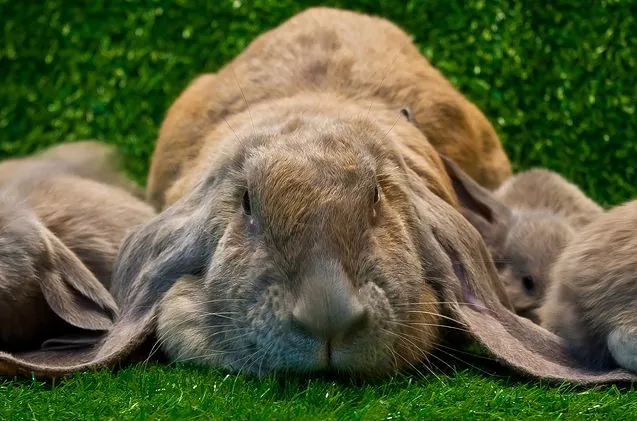
Lop-eared rabbits need extra attention for their ears. Knowing the signs of healthy ears helps you spot problems early.
Clean and Pink Inside
Look for ears that are clean and pink inside. There should be no redness, swelling, or discharge. The skin inside should be smooth with no flaky patches.
No Strong Smell and Scratches
Healthy ears don’t have a strong smell. A slight waxy odor is normal, but anything stronger may mean an issue. Your rabbit’s ears should be free of scratches or wounds. Check for any crusty areas or scabs indicating mites or an infection.
Clean Fur
The fur around the ears should be clean and dry. Matted or wet fur can lead to skin problems.
Watch your rabbit’s behavior. They shouldn’t scratch their ears too much or shake their head often. These can be signs of discomfort. Gently clean their ears weekly with a damp cotton ball. This helps you spot any changes and keeps the ears healthy. Remember, lop ears need extra care due to their shape. Regular checks help keep your bunny comfortable and catch any issues early.
When to Seek Professional Help
Lop Ear rabbits need regular ear care to keep them healthy and comfortable. However, sometimes you might need a vet’s help with Lop Ear Rabbits Ear Care. Here are signs to watch for:
Ear Infections
If you see redness, swelling, or discharge in your rabbit’s ears, it’s time to see a vet. Bad smells from the ears are also a warning sign.
Head Tilting
This could mean an inner ear problem. Be sure to get help if you notice this.
Scratching
A lot of ear scratching might mean mites or an infection. A vet can find the cause and give the right treatment.
Balance Issues
If your rabbit seems unsteady, it could be an ear problem. This needs quick attention.
Hearing Changes
If your rabbit doesn’t respond to sounds like before, their hearing might be affected. Ear treatments from a vet might include:
- Pain relief
- Ear flushes
- Special ear powders
Remember, early care is key. If you need more clarification, it’s better to ask a vet. They can check your rabbit’s ears and give the right care. Regular ear cleaning at home is good. But leave complex treatments to the experts. They know how to handle lop ears safely.
Here’s an additional video on how to clean a Lop rabbit’s ears!
By: Abigail Rose
Ensuring Optimal Ear Health for Your Lop Ear Rabbit
Caring for your Lop Ear rabbit’s ears is essential for their health and happiness. Their distinctive floppy ears require special attention to prevent and address common issues. By understanding the unique challenges and implementing regular care routines, you can ensure your furry friend remains comfortable and problem-free.

With the right knowledge and proactive measures, including regular ear checks, proper cleaning techniques, and timely veterinary visits, you can effectively manage and prevent many ear problems. Remember, early detection is key to addressing issues before they become serious. By staying vigilant and responsive to your Lop Ear rabbit’s needs, you’ll help them enjoy a healthy, happy life with their charming, floppy ears.
Embrace the tips and solutions outlined in this guide, and you’ll be well-equipped to provide the best care for your beloved lop-eared companion. Your dedication will maintain their ear health and contribute to their overall well-being.
Frequently Asked Questions
How Can I Recognize the Symptoms of an Ear Infection in My Rabbit?
Watch for signs like head tilting, scratching at ears, or losing balance. Your rabbit might shake its head more often or have redness and swelling around the ears. You may also notice a bad smell or discharge from the ears.
What Are the Most Effective Treatments for Rabbit Ear Infections?
Antibiotics prescribed by a vet are usually the best treatment. Your vet might recommend ear drops or oral medicine. It’s important to finish the full course of treatment, even if symptoms improve quickly.
What is the Best Way to Clean My Rabbit's Ears Safely at Home?
Use a soft, damp cloth to wipe the outer ear gently. For deeper cleaning, use a vet-approved ear cleaner. Be very gentle and avoid pushing anything into the ear canal. Always reward your rabbit after cleaning to make it a positive experience.
Come Hop with Us on Social Media!
Do you adore your bunny? So do we at The Rabbit Hop!
Find us online for:
- Bunny Fun: Cute videos, interesting facts, and tips for keeping your bunny happy!
- Top Product Reviews: Find out what’s best for your fluffy friend.
- Bunny Community: Meet and connect with other bunny lovers just like you
Follow us on:
Let’s make your bunny the happiest hopper on the block!



